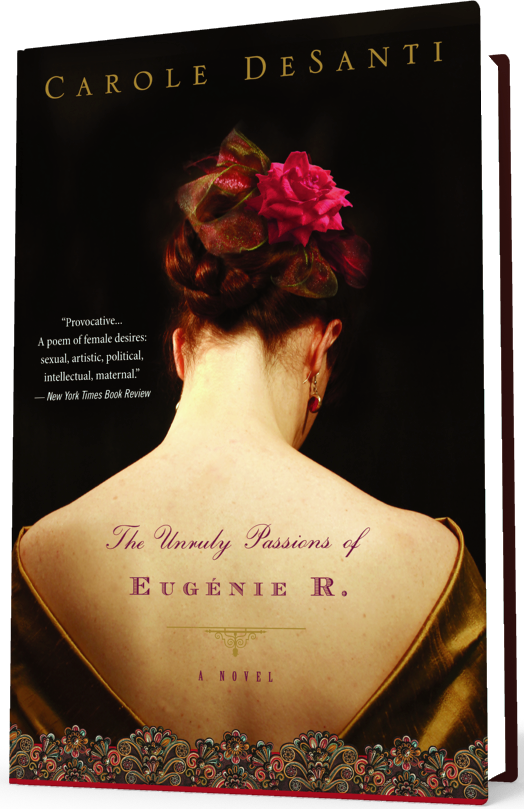
Unruly Passions
Carole DeSanti's epic novel The Unruly Passions of Eugénie R. tells the story of a woman’s coming-of-age and into consciousness during France’s Second Empire.
The Unruly Passions of Eugénie R.
“Epic times make for epic books. …If you love a novel that brings a place and time alive again, this one is for you. If you love a novel of character and adversity, again, here it is.”
A NEW YORK TIMES BOOK REVIEW EDITORS’ CHOICE
The Unruly Passions of Eugénie R. tells the story of a woman’s coming-of-age and coming to consciousness during a time of wide social upheaval, France’s Second Empire, the Franco-Prussian War and Paris Commune era. Eugénie R., born in the rural south, foie gras country, accompanies her lover to Paris but soon finds herself marooned. An outcast, she takes to the streets, navigating her way through the treacherous waters of sexual commerce. Paris is a gleaming center of art and culture and a sea of corruption, with a vast gulf between the lives of the privileged and the poor — a place both soulless and ripe with possibility.
This novel came about as I was trying to understand my own life, in our own era. But I had to step back in time to see the weave of history, to examine remnants of the past that have been passed down to us. The great voices of the period — Balzac, Zola, even Flaubert and George Sand — overlooked qualities I wanted to explore in Eugénie, especially the ways in which such a woman might move from a crisis of doubt and betrayal to self-knowledge and self-creation.
— Carole DeSanti
A TRANSPORTING DEBUT SET IN THE BACKSTREETS AND BORDELLOS OF 19TH CENTURY PARIS
Eugénie's story draws from the records of actual women of the period like the sculptor Camille Claudel; courtesan and memoirist Célèste Mogador; teacher and revolutionary Louise Michel and lesser-known figures. Diaries, court records, artifacts and photographs, paintings and textiles, the work of historians and legal scholars then and now inform the world of the novel.
For Eugénie, as for us, growth and understanding come both from outside and within, from her own past and living fully in the unfolding present.
Order Unruly Passions

Print or EBook
Audiobook
“Reading “The Unruly Passions of Eugénie R.” is like entering a lush dream filled with beauty and brutality. This astonishing debut is a panoramic story of war and peace, love and betrayal, innocence and hard-won wisdom, told through the eyes of a compelling woman who kept me at her side through it all.”
“Eugénie R. is every girl in a daguerreotype looking over her shoulder, every woman with a baby hurrying away from you down a gas lit street, and then too, she is the first of her kind, a woman who stands at her own barricades and fights a France determined to render her silent. I lost myself wholeheartedly in her story, and would have followed her down any narrow alley into any candlelit room just to know what happened, to stay back there and to delay coming home.”
Charles Marville, Rue des Lavandieres de la Place Maubert, circa 1853–70 (detail). *
“All fiction magically turns something invented into what seems real, but this novel is more magical than most. I loved “The Unruly Passions of Eugénie R.” The main character’s experience is so real and intense that I had to re-orient myself when I looked up from the book, and it was hard to remember that Carole DeSanti didn’t live in nineteenth century France.”
“In Carole DeSanti’s “The Unruly Passions of Eugénie R.,” Second Empire Paris, greedy in peacetime and ravenous in war, is so richly and sensuously drawn one can almost feel it. ... Eugénie makes choices. Perhaps if her contemporary, Emma Bovary, had possessed the ingenuity, wit, and tenacity of Eugénie R., Madame B. wouldn’t have had to take that arsenic.”
“Against a carefully recreated landscape of France and the City of Light during the 1860s, with the Prussian army heading for Paris, DeSanti brings a 21st-century sensitivity for the plight and passions of women in her rendering of Eugénie and the women and men among whom she comes to travel (and eat and drink).”
“This is a France we scarcely know, more famine, slaughter and savagery than feast, culminating in the Siege of Paris, blessed as ever with a loveliness of landscape, cursed with a conviction of belief. DeSanti’s undoubted literary skills bring the life and times to vivid life. Death does its worst, passion wears itself out, civilization moves a notch forward, and with it, or because of it, female understanding of what it is to be a woman. A book to make you think.”
NEWS & Reviews
Sarah Bernhardt by Félix Nadar, circa 1864 (detail). *




